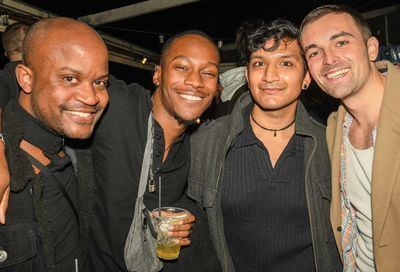Supreme Court pushes nation one step closer to full marriage equality

In what was a watershed moment Wednesday for the gay-rights movement, pushing the nation closer than ever to full marriage equality, the Supreme Court ruled 5-4 in two landmark cases to strike down the federal government’s definition of marriage as between a man and woman and to dismiss the case regarding California’s ban on same-sex marriage, thus returning marriage equality to the state.
In a 5-4 opinion authored by Justice Anthony Kennedy and joined by Justices Ruth Bader Ginsburg, Stephen Breyer, Sonia Sotomayor and Elena Kagan, the court ruled that Section 3 of the Defense of Marriage Act is unconstitutional and violates the Fifth Amendment of the Constitution.
“The power the Constitution grants it also restrains. And though Congress has great authority to design laws to fit its own conception of sound national policy, it cannot deny the liberty protected by the Due Process Clause of the Fifth Amendment,” the court ruled.
The case, United States v. Windsor, surrounds 83-year-old Edith Windsor, who sued the federal government to recoup about $363,000, the federal estate tax she was forced to pay on her “inheritance” following the death of her wife, Thea Spyer. The federal government does not tax wealth that passes to a surviving heterosexual spouse. Because of DOMA, however, the federal government has refused to recognize Windsor and Spyer’s 2007 Canadian marriage license. A district court and the Second Circuit Court of Appeals had both found DOMA unconstitutional.
According to the majority, DOMA “writes inequality into the entire United States Code” by impacting more than 1,000 statues and numerous federal regulations pertaining to Social Security, housing, taxes, criminal sanction, copyright and veterans’ benefits.
“DOMA’s principal effect is to identify a subset of state- sanctioned marriages and make them unequal,” the majority wrote. “The principal purpose is to impose inequality, not for other reasons like governmental efficiency.”
Much as Ginsburg memorably noted with an analogy about skim and regular milk during oral arguments in March, the court stated that DOMA creates “two contradictory marriage regimes within the same State.”
“By this dynamic DOMA undermines both the public and private significance of state-sanctioned same-sex marriages; for it tells those couples, and all the world, that their otherwise valid marriages are unworthy of federal recognition. This places same-sex couples in an unstable position of being in a second-tier marriage,” Kennedy wrote.
In his dissent, Chief Justice John Roberts wrote that Congress was justified in 1996 when DOMA was passed “to retain the definition of marriage that, at that point, had been adopted by every State in our Nation, and every nation in the world.”
“At least without some more convincing evidence that the Act’s principal purpose was to codify malice, and that it furthered no legitimate government interests, I would not tar the political branches with the brush of bigotry,” Roberts wrote.
Justices Antonin Scalia, Clarence Thomas and Samuel Alito also dissented. Scalia read his lengthy dissent from the bench, stating that the court “has cheated both sides, robbing the winners of an honest victory, and the losers of the peace that comes from a fair defeat.”
“We might have covered ourselves with honor today, by promising all sides of this debate that it was theirs to settle and that we would respect their resolution. We might have let the people decide. But that the majority will not do,” Scalia said.
“By formally declaring anyone opposed to same-sex marriage an enemy of human decency, the majority arms well every challenger to a state law restricting marriage to its traditional definition,” Scalia said. “The result will be a judicial distortion of our society’s debate over marriage.”
The decision came 10 years to the day since the Supreme Court ruled in another landmark gay rights case, Lawrence v. Texas, which struck down a Texas anti-sodomy law in 2003. In his dissent in that case, for which Kennedy also wrote the majority, Scalia questioned what would stop the next step from being same-sex marriage. That prescient question was not lost on Scalia in his written dissent in the DOMA case.
“When the Court declared a constitutional right to homosexual sodomy, we were assured that the case had nothing, nothing at all to do with ‘whether the government must give formal recognition to any relationship that homosexual persons seek to enter,'” Scalia wrote in his dissent. “It takes real cheek for today’s majority to assure us, as it is going out the door, that a constitutional requirement to give formal recognition to same-sex marriage is not at issue here—when what has preceded that assurance is a lecture on how superior the majority’s moral judgment in favor of same-sex marriage is to the Congress’s hateful moral judgment against it. I promise you this: The only thing that will ‘confine’ the Court’s holding is its sense of what it can get away with.”
In the Proposition 8 case, Hollingswroth v. Perry, the justices ruled 5-4 to dismiss the case on standing, stating that supporters of California’s same-sex marriage ban did not have the jurisdiction to defend the law in federal court after the state refused to do so.
“We have never before upheld the standing of a private party to defend the constitutionality of a state statute when state officials have chosen not to,” Chief Justice John Roberts wrote for the majority. “We decline to do so for the first time here.”
Roberts’s majority opinion was joined by Justices Ruth Bader Ginsburg, Antonin Scalia, Stephen Breyer and Elena Kagan — an unusual mix for a court that has been divided along ideological lines for many of the court’s decisions this term. Justice Anthony Kennedy dissented and was joined by Justices Clarence Thomas, Samuel Alito and Sonia Sotomayor.
“Because petitioners have not satisfied their burden to demonstrate standing to appeal the judgment of the District Court, the Ninth Circuit was without jurisdiction to consider the appeal,” Roberts wrote. “The judgment of the Ninth Circuit is vacated, and the case is remanded with instructions to dismiss the appeal for lack of jurisdiction.”
By declaring that the case did not have standing to be before the high court, the justices never reached the broader arguments argued by the plaintiffs in the case that marriage equality should be legalized nationwide.
Theodore Olson, the conservative half of the star legal duo leading the charge against Proposition 8, argued during oral arguments before the court on March 26 that not only is California’s same-sex marriage ban unconstitutional, but so is denying same-sex couples the right to marry anywhere in the country.
California voters approved Proposition 8 in November 2008, taking away the right of same-sex couples to marry after that right had already been granted by the California Supreme Court.
Although the decision was not the sweeping ruling many had hoped for, plaintiffs in the Proposition 8 case applauded the news that marriage equality will soon return to California.
Speaking to reporters on the steps of the Supreme Court after the decisions, lead co-counsel David Boies said that when the Supreme Court does address the questions raised in the Proposition 8 case, they will have no choice but to usher in marriage equality nationwide
“Everything that the Supreme Court said in the Defense of Marriage Act case, where they did reach the merits, demonstrates that when that case does finally come to the United States Supreme Court on the merits, marriage equality will be the law throughout this land,” Boies said. “The next step is to translate the promise that was in Lawrence that was reaffirmed today in the DOMA case, that every citizen in every state has the right to marry the person that they love.”
Advocates have long promised to return to the Supreme Court for the sweeping ruling they have sought, were it not to come in these cases. Boies was joined by Human Rights Campaign President Chad Griffin, who helped found the American Foundation for Equal Rights, which brought the Proposition 8 case. Declaring that “apathy and passivity are no better than bigotry,” Griffin announced a new promise: Noting it took less than five years to restore marriage equality in California, Griffin declared, “Within five years we will bring marriage equality to all 50 states in this vast country.”
Read the Supreme Court’s opinions in both cases here.
[Photo 1: Celebrations outside the Supreme Court (Credit: Todd Franson/Metro Weekly). Photo 2: The Proposition 8 plaintiffs speak to reporters outside the Supreme Court (Credit: Justin Snow/Metro Weekly).]
Support Metro Weekly’s Journalism
These are challenging times for news organizations. And yet it’s crucial we stay active and provide vital resources and information to both our local readers and the world. So won’t you please take a moment and consider supporting Metro Weekly with a membership? For as little as $5 a month, you can help ensure Metro Weekly magazine and MetroWeekly.com remain free, viable resources as we provide the best, most diverse, culturally-resonant LGBTQ coverage in both the D.C. region and around the world. Memberships come with exclusive perks and discounts, your own personal digital delivery of each week’s magazine (and an archive), access to our Member's Lounge when it launches this fall, and exclusive members-only items like Metro Weekly Membership Mugs and Tote Bags! Check out all our membership levels here and please join us today!



























